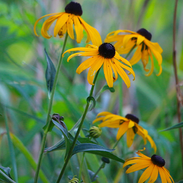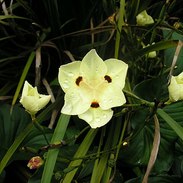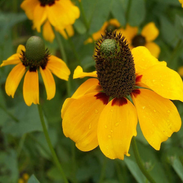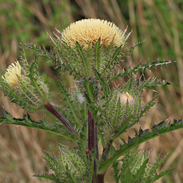The Bull Thistle (Cirsium vulgare), with its imposing spiky leaves and vibrant purple flowers, might be considered a nuisance by gardeners. But this tenacious plant, often found in fields and meadows, has a long history of medicinal use that dates back centuries. So before you banish it from your yard, let's explore the healing potential hidden within this prickly character.
Traditional Uses:
Liver Tonic and Detoxifier: Bull Thistle has a long tradition of use as a liver tonic, supporting its health and function. It was believed to cleanse the liver and gallbladder, improve digestion, and help with jaundice and other liver-related ailments.
Circulatory Support: Traditionally, Bull Thistle was used to improve blood circulation and address issues like varicose veins and hemorrhoids.
Anti-inflammatory: The plant was used to reduce inflammation in various conditions, including rheumatism, gout, and skin infections.
Wound Healing: Crushed leaves or poultices were applied to wounds, sores, and boils to promote healing and prevent infection.
Potential Properties & Modern Research:
While scientific research on Bull Thistle is still somewhat limited, some studies support its traditional uses:
Liver Protection: Studies suggest that Bull Thistle extracts may have protective effects on the liver, helping to shield it from damage caused by toxins and promoting regeneration. This may be attributed to its antioxidant and anti-inflammatory properties.
Antioxidant Activity: Bull Thistle contains antioxidants, particularly silymarin, which can help protect cells from damage caused by free radicals.
Anti-inflammatory Effects: Research indicates that Bull Thistle may have anti-inflammatory properties, which could explain its traditional use for various inflammatory conditions.
Antibacterial and Antifungal Potential: Some studies suggest that Bull Thistle may possess antibacterial and antifungal activity, supporting its use for wound healing and infections.
Cautions and Considerations:
Spines: Handle Bull Thistle with care due to its sharp spines.
Allergies: As with any plant, some individuals may be allergic to Bull Thistle.
Pregnancy and Breastfeeding: Pregnant and breastfeeding women should avoid using Bull Thistle due to a lack of safety data.
Drug Interactions: There is limited information on potential drug interactions, so consult with a healthcare professional if you are taking any medications.
Sustainable Harvesting: If you plan to wildcraft Bull Thistle, ensure you do so sustainably and with respect for the environment.
The Future of Bull Thistle:
As research continues, Bull Thistle may reveal further medicinal potential. Its traditional uses and preliminary studies suggest it could be a valuable source of natural remedies for liver health, inflammation, and other ailments.
Disclaimer: This blog post is for informational purposes only and should not be considered medical advice. Always consult with a qualified healthcare professional before using any herbal remedies.













